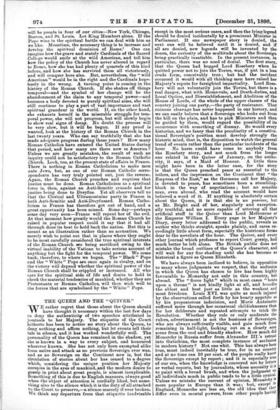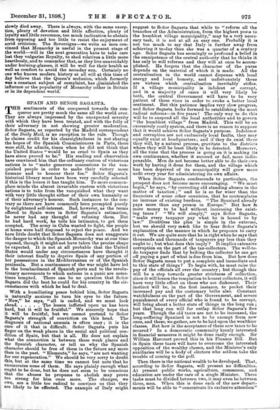THE QUEEN AND THE "QUIVER."
E rather regret that those about the Queen should have thought it necessary within the last few days to deny the authenticity), of two speeches attributed in journals to her Majesty. The etiquette of the Court hitherto has been to notice no story about the Queen, to deny nothing and affirm nothing, but let events tell their tale in silence, and it has worked wonderfully well. The personality of the Queen has remained in the shadow, yet she is known in a way to every subject, and honoured wherever known. She has not only been exempted alike from satire and attack as no previous Sovereign ever was, and as no Sovereign on the Continent now is, but the circulation of stories about her has ceased to a degree which, considering the unique position her Majesty occupies in the eyes of mankind, and the modern desire to gossip in print about great people, is almost inexplicable. Something of this is due to English manners, always good when the object of attention is cordially liked, but some- thing also to the silence which it is the duty of all attached to the Court to preserve,—a silence scarcely if ever broken. We think any departure from that etiquette inadvisable U except in the most serious cases, and then the lying legend should be denied incidentally by a prominent Minister in Parliament. If one newspaper story is denied, the next one will be believed until it is denied, and if all are denied, new legends will be invented by the dozen, the curiosity of the multitude about the Sovereign being practically insatiable. In the present instances, in particular, there was no need of denial. The first story, that the Queen had begged Lord Rosebery when he quitted power not to join the Tories, was, if put in a less crude form, conceivably true ; but had the incident occurred it would with all thinking men have raised her Majesty's repute for farsighted impartiality. Lord Rose- bery will not voluntarily join the Tories, but there is a real danger, what with Home-rule, and Death-duties, and Local Option, and Disestablishment, and Abolition of the House of Lords, of the whole of the upper classes of the country joining one party,—the party of resistance. That ruinous cleavage has never happened in our history, and we can easily believe that a Sovereign who looks out from the hill on the plain, and has to pick Ministers and then be guided by them, would regard the possibility of its occurrence with something of dismay. So would every historian, and we fancy that the peculiarity of a constitu- tional Sovereign's position must develop strongly the historic mind, that is, the disposition to watch the general trend of events rather than the particular incidents of the hour No harm could have come to anybody from the Rosebery story, and not much from the longer one related in the Quiver of January, on the autho- rity, it says, of a Maid of Honour. A little there might have been in the latter case, for the story is that the Queen preached peace as essential to the toilers, and the impression on the Continent that "the Empress of the East," as the Germans call her Majesty, is devoted to peace, has sometimes been a stumbling. block in the way of negotiations ; but no sensible man, even abroad, who read the account would have believed a word of it. If anything is absolutely certain about the Queen, it is that she is no poseuse, but as Mr. Bright said of her, singularly and exception- ally truthful, and no more capable of uttering all that artificial stuff in the Quiver than Lord Melbourne or the Emperor William I. Every page in her Majesty's Diary, every letter addressed to the public, reveals an author who thinks straight, speaks plainly, and cares ex- ceedingly little about form, especially the histrionic forms dear to the novelists of the hour. The Quiver, and every other journal which professes to report Court gossip, had much better be left alone. The British public does not mistake the broad outlines of the Queen's character, and will wait for any fine shading until she has become as historical a figure as Queen Elizabeth.
We have always been inclined to believe, in opposition to many whose judgments we respect, that the seclusion in which the Queen has chosen to live has been highly favourable to Monarchy not only in this country, but abroad. The "fierce light" which in most cases "beats upon a throne" is not kindly light at all, and benefits the ablest and best just as little as the weakest and most frivolous. Louis XVI. was quite as much injured by the observations called forth by his hearty appetite as by his preposterous indecision, and Marie Antoinette suffered more through her occasional childishnesses than for her deliberate and repeated attempts to trick the Revolution. Whether they rule or only moderate the rulers, advertisement is not the business of Sovereigns, who are always sufficiently visible, and gain much from remaining in half-light, looking out on a clearly seen scene from the cool and friendly shadow. How much did Monarchy in Russia suffer from Alexander M.'s retreat into Gatschina, the most complete instance of seclusion in modern history ? Not one whit. This has always been true, must indeed inevitably be true, for in no country and at no time can 10 per cent. of the people really know the Sovereign except by report ; and it is especially true of our era, when the knowledge is conveyed not by letters or verbal reports, but by journalists, whose necessity it Is to paint with a broad brush, and when the judgment on all individuals much in public tends to be a little cynical. Unless we mistake the current of opinion, Monarchy more popular in Europe than it was ; but, except in England, Monarchs are less so, the old idea that they differ even in mental powers, from other people having slowly died away. There is always, with the same excep- tion, plenty of devotion and little affection, plenty of loyalty and little reverence, too much inclination to abstain from opposing and too little to resist the enjoyment of acrid criticism. The Sovereigns—we write as men con- vinced that Monarchy is useful in the present stage of the world—will in the next generation have to take care lest they vulgarise Royalty, to shed relatives a little more heartlessly, and to remember that, as they live unavoidably under burning-glasses, it will be well for their health as well as comfort to avoid the noonday sun. Certainly no one who knows modern history at all will at this time of day believe that the Queen's seclusion, which formerly was a constant subject of complaint, has .diminished the influence or the popularity of Monarchy iitier in Britain or in its dependent world.



































 Previous page
Previous page